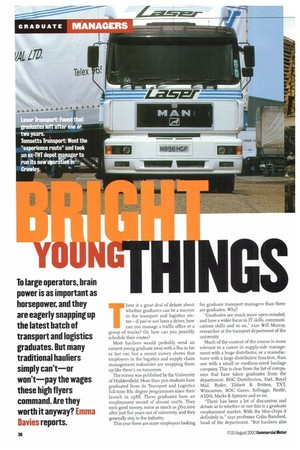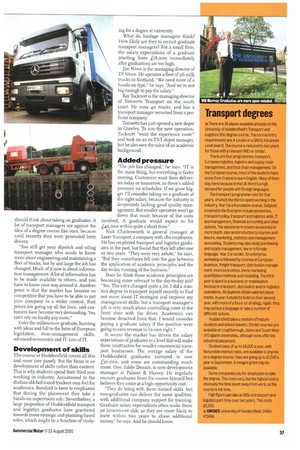To large operators, brain power is as important as horsepower,
Page 38

Page 39

If you've noticed an error in this article please click here to report it so we can fix it.
and they are eagerly snapping up the latest batch of transport and logistics graduates. But many traditional hauliers simply can't—or won't—pay the wages these high flyers command. Are they worth it anyway? Emma Davies reports. There is a great deal of debate about whether graduates can be a success in the transport and logistics sector—if you've not been a driver, how can you manage a traffic office or a group of trucks? Or, how can you possibly schedule their routes?
Most hauliers would probably send an earnest young graduate away with a flea in his or her ear, but a recent survey shows that employers in the logistics and supply chain management industries are snapping them up like there's no tomorrow.
The survey was published by the University of Huddersfield. More than 500 students have graduated from its Transport and Logistics full-time BSc degree programmes since their launch in 1988. These graduates have an employment record of almost i00%. They earn good money, some as much as go,000 after just five years out of university, and they generally stay in the industry.
This year there are more employers looking for graduate transport managers than there are graduates. Why?
"Graduates are much more open-minded, and have a wider focus in IT skills, communications skills and so on," says Will Murray, researcher at the transport department of the university.
Much of the content of the course is more relevant to a career in supply-side management with a huge distributor, or a manufacturer with a large distributive function, than one with a small or medium-sized haulage company. This is clear from the list of companies that have taken graduates from the department: BOC Distribution, Exel, Royal Mail, Ryder, Tibbett 8, Britten, TNT, Wmcanton, BOC Gases, Kelloggs, Nestle, ASDA, Marks & Spencer and so on.
"There has been a lot of discussion and debate as to whether or not this is a graduate employment market. With the blue-chips it definitely is," says professor Colin Bamford, head of the department. "But hauliers also should think about taking on graduates. A lot of transport managers are against the idea of a degree course like ours, because until recently they were promoted lorry drivers.
You still get your dipstick and oilrag transport manager who needs to know more about engineering and maintaining a fleet of trucks, but by and large the job has changed. Much of it now is about information management. A lot of information has to be made available to others, and you have to know your way around it. Another point is that the market has become so competitive that you have to be able to put your company in a wider context. Fuel prices are going up all the time, and customers have become very demanding. You can't rely on loyalty any more."
Enter the millennium graduate, bursting with ideas and full to the brim of European legislation, time-management skills, advanced economics and IT Lots of IT.
Development of skills
The course at Huddersfield covers all this and more (see panel). But the focus is on development of skills rather than content. This is why students spend their third year working in industry. Accustomed to the disdain old-fashioned truckers may feel for academics, Bamford is keen to emphasise that during the placement they take a hands-on supervisory role. Nevertheless, a large proportion of Huddersfield transport and logistics graduates have gravitated towards more strategic and planning-based roles, which might be a function of study ing for a degree at university.
What do haulage managers think? How likely are they to recruit graduate transport managers? For a small firm, the salary expectations of a graduate (starting from f18,00o immediately after graduation) are too high.
Jim Niven is the managing director of TP Niven, He operates a fleet of 26 milk trucks in Scotland. "We need more of a hands-on type," he says. "And we're not big enough to pay the salary."
Ray Tucicnott is the managing director of Tomsetts Transport on the south coast. He runs 40 trucks, and has a transport manager recruited from a perfume company Tomsetts has just opened a new depot in Crawley. To run the new operation, Tucknott "went the experience route" and took on an ex-TNT depot manager, but he also sees the value of an academic background.
Added pressure
"The job has changed," he says. "IT is the main thing, but everything is faster moving. Customers want their deliveries today or tomorrow, so there's added pressure on schedules. If we grow bigger I'll consider taking on a graduate at the right salary, because the industry is desperately lacking good quality management. But smaller operators won't go down that route because of the costs involved. A graduate would expect to hit £40,000 within quite a short time."
Nick Charlesworth is general manager at Laser Transport, a company with i8o employees. He has employed transport and logistics graduates in the past, but found that they left after one or two years. "They were very astute," he says, "But they sometimes fell into the gap between the application of academic principles and the day-to-day running of the business."
Does he think those academic principles are becoming more relevant to the day-to-day job? "Yes. The job's changed quite a lot. I did a masters degree in transport myself recently to find out more about IT strategies and improve my management skills, but a transport manager's job is very much about controlling costs at the front door with the driver. Academics can become detached from that. I would consider paying a graduate salary if the position were going to earn revenue in its own right."
It seems the market has driven the salary expectations of graduates to a level that will make them unattractive for smaller commercial transport businesses. The average salary of the Huddersfield graduates surveyed is over £30,000, and some are commanding much more. One, Eddie Dennis, is now development manager at Palmer & Harvey. He regularly recruits graduates from the course himself but believes they come at a high opportunity cost.
"They do bring with them trained skills, but non-graduates can deliver the same qualities, with additional company support for training. Graduate salary expectations often make them an investment risk, as they are more likely to leave within two years to chase additional money" he says. And he should know.




































































































